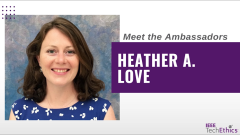The arts are among the fields seeing both benefits and challenges from the use of generative AI tools, stirring discussion on what it means to be an artist. This IEEE TechEthics public form addresses the impacts AI is having on the artistic process.
About the Panelists:
- Dr. Ahmed Elgammal is a professor at the Department of Computer Science and an Executive Council Faculty at the Center for Cognitive Science at Rutgers University. He is the founder and director of the Art and Artificial Intelligence Laboratory at Rutgers. Dr. Elgammal has published over 200 peer-reviewed papers, book chapters, and books in the fields of computer vision, machine learning and digital humanities. He is also the founder of Playform AI, a platform for making AI accessible for artists.
- Anna Gressel is a counsel in the Litigation Department at Paul, Weiss, Rifkind, Wharton & Garrison LLP, She is deeply experienced in regulatory investigations, examinations, and civil litigation related to digital technologies and leverages this extensive knowledge to counsel companies in implementing effective compliance, governance, and enterprise risk management policies and procedures. She has also represented technology companies in challenging and complex regulatory inquiries involving AI products and services, including alleged discrimination under U.S. civil rights laws involving machine learning algorithms. In 2023, Anna was named by Re-Work as one of the “Top 100 Women Leading AI.”
- Carla Gannis’s art is characterized by a commitment to experimentation. Throughout her career, she has worked with an array of mediums and tools, including drawing, painting, video, interactivity, extended reality, and machine learning models. Her multilayered narratives engage with the loci of identity within the context of atomized and hyperreal 21th century conditions. Carla’s work has appeared in exhibitions, screenings and internet projects across the globe and has been featured in Wired, FastCo, Hyperallergic, The Wall Street Journal, The New York Times, El PaÍs, and The Los Angeles Times, among others. She is an Industry Professor at NYU’s Tandon School of Engineering in the Integrated Design and Media Program.
- Dan Navarro enjoys a six-decade career as a songwriter, singer, recording artist, voice actor, and activist. This has included over 21 acclaimed solo and duo albums; thousands of concerts; Oscar-winning films "Encanto,” "Coco" and "Happy Feet”, as well as others such as "Puss In Boots: The Last Wish" and “The Book of Life”; and numerous TV shows, games, and commercials. He co-wrote Pat Benatar’s Grammy-nominated “We Belong”, plus songs for The Bangles, Dionne Warwick, and Dave Edmunds. Dan serves on the SAG-AFTRA National Board and is a Trustee on the AFM & SAG-AFTRA Intellectual Property Rights Fund. He has testified on AI before the House Judiciary IP Subcommittee and before international copyright ministers at the US Patent and Trademark Office.
- Mark A. Vasquez (moderator) is a Certified Association Executive (CAE) with over 30 years of experience in association management at IEEE. He currently serves as the senior program manager for IEEE TechEthics, a program that drives conversations about the ethical and societal impacts of technology. In this capacity, he works to develop relationships with others in the technology ethics community, produces events, convenes thought leaders, and more. Mark is an engineering graduate of The Cooper Union.
Recorded on 24 January 2024 as part of the IEEE TechEthics Conversations Series.
Produced in partnership with The Cooper Union. Introduction by Barry Shoop, Dean of the Albert Nerken School of Engineering at The Cooper Union.
The arts are among the fields seeing both benefits and challenges from the use of generative AI tools, stirring discussion on what it means to be an artist. This IEEE TechEthics public form addresses the impacts AI is having on the artistic process.
 Cart
Cart Create Account
Create Account Sign In
Sign In





